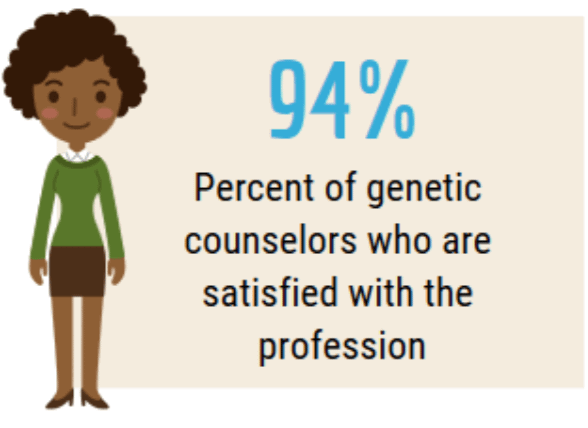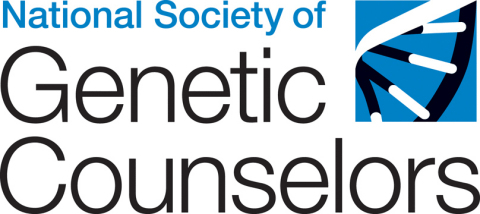The National Society of Genetic Counselors’ (NSGC) 2018 Professional Status Survey Reports have been released. In this blog post, we outline the highlights from the publically available Executive Summary. All of the graphics and information in this blog are directly from the Excutive Summary.
Members of the NSGC have access to all the specific reports including Demographics and Methodology, Salary and Benefits, Work Environment, Service Delivery and Access, and Professional Overview and Satisfaction. The public can purchase these reports.
 An astounding 94% of respondents reported they are “satisfied” or “highly satisfied” with the genetic counseling profession. This is good news for the career recently named as one of the “25 Amazing Healthcare Support Jobs for 2017” by U.S. News and World Report. And most recently genetic counseling landed the number 1 job on Career Cast’s “The Best Jobs of 2018”.
An astounding 94% of respondents reported they are “satisfied” or “highly satisfied” with the genetic counseling profession. This is good news for the career recently named as one of the “25 Amazing Healthcare Support Jobs for 2017” by U.S. News and World Report. And most recently genetic counseling landed the number 1 job on Career Cast’s “The Best Jobs of 2018”.
The U.S. Bureau of Labor Statistic projects a growth rate of 29% for genetic counseling positions over the years 2016-2026. This far exceeds the average overall growth rate of 7% for all occupations.
Cancer and Prenatal were the most frequently cited specific practice areas by a substantial margin – together they were chosen as practice areas by 78% of respondents. Within genetic counselors’ primary area of practice, the top roles reported were clinical care (71%), student supervision (31%), and clinical coordination (28%). About one-third (32%) of genetic counselors responded that they work remotely, either some or all of the time. Of the genetic counselors who work remotely 100% of the time, 90% work in a different state than their employer.
A large group of genetic counselors reported that they are involved in teaching. The most common teaching audiences were genetic counselors/genetic counseling students (69%), followed by medical students (51%), and physicians (47%).

Over half of genetic counselors who responded reported that they authored or co-authored publications in 2016-2017.
The most common service delivery method reported among genetic counselors is still in-person (96%), followed by phone (59%), web-based or video (19%), and group counseling (7%). These numbers do not add to 100% because genetic counselors responded they use multiple forms of communication.

Most respondents provide direct patient care as a regular part of their jobs (59%), while 25% do not provide direct patient care.

According to the Accreditation Council for Genetic Counseling (ACGC) as of May 2018 there are 43 accredited training programs in the U.S. and Canada. Here is a list of all 43 programs, along with the developing programs.
 The average yearly gross salary reported by full-time genetic counselors was $88,498. This is significantly higher than 2016’s average of $81,377. A genetic counselor’s salary can reach up to $246,000 depending on specialty area and expertise. In general, full-time genetic counselors in non-direct patient care positions earned the most, followed by genetic counselors in mixed positions, and then those in direct patient care positions.
The average yearly gross salary reported by full-time genetic counselors was $88,498. This is significantly higher than 2016’s average of $81,377. A genetic counselor’s salary can reach up to $246,000 depending on specialty area and expertise. In general, full-time genetic counselors in non-direct patient care positions earned the most, followed by genetic counselors in mixed positions, and then those in direct patient care positions.

About 23% of genetic counselors who responded held faculty appointments. The most common appointment was adjunct instructor (16%), followed by assistant professor (14%), and instructor (12%).
Have these statistics piqued your interested in becoming a genetic counselor? Two of our blog categories are designed just for you!
“For Students”, covers information and advice about the application process, job interviews, and other resources.
“Genetic Counseling”, provides an insider view of the genetic counseling profession including Trailblazing Genetic Counselor interviews, recaps of webinars and Tweechats, and hot topics in the field.

